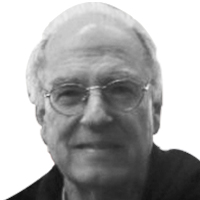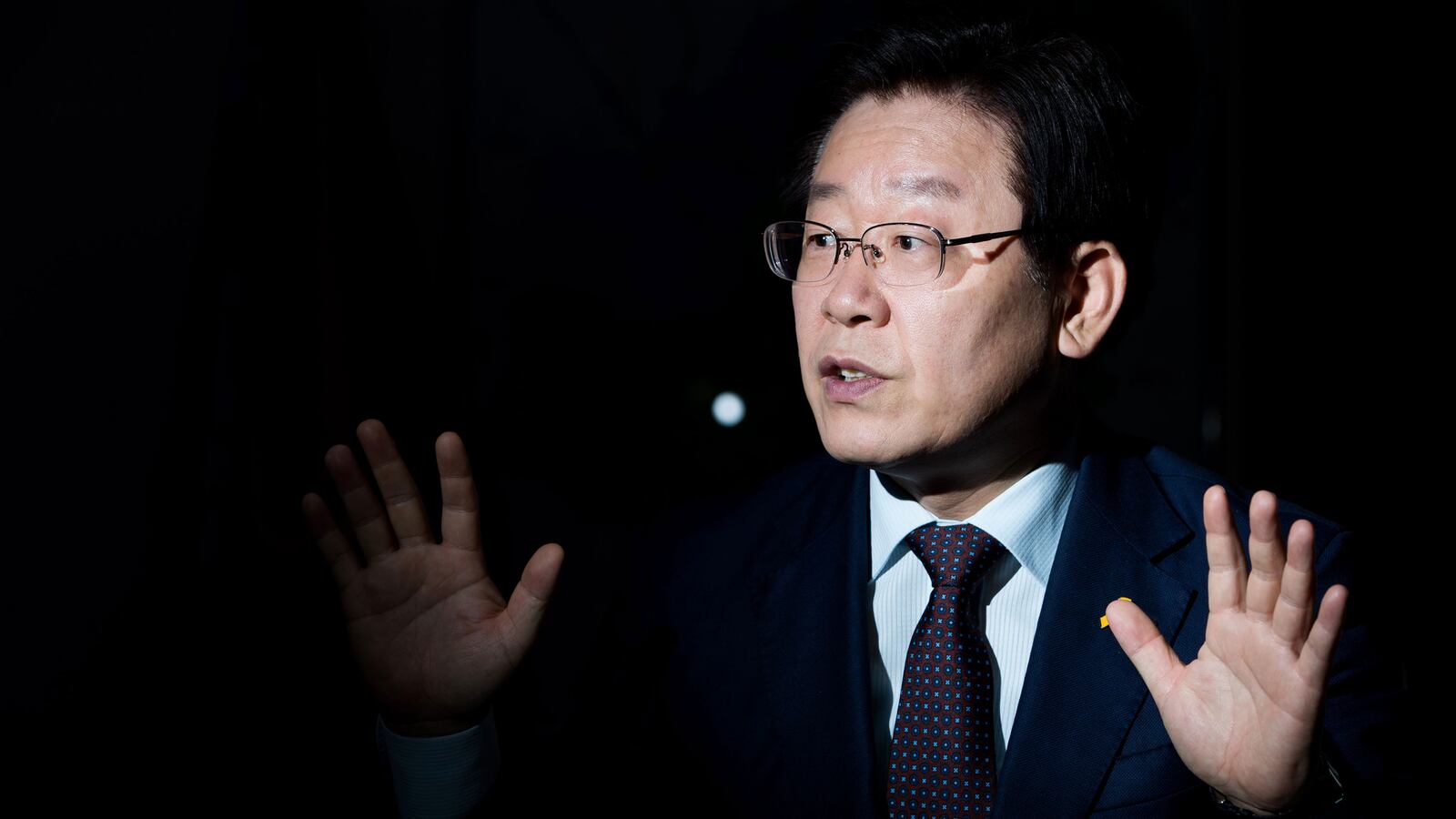SEONGNAM, South Korea—Three potential whistleblowers are dead in “mafia”-linked scandals threatening to engulf one of the two leading contenders in a tight race to become South Korea’s next president.
The ruling party’s candidate for the top job is suspected of profiting immensely from a multi-million-dollar real estate swindle, which allegedly included members of organized crime in his hometown of Seongnam.
Three men who may have had access to damning information about Lee Jae-myung’s murky past as mayor of Seongnam have dropped dead in little more than two months.
Just weeks before the crucial presidential election, a veil of silence has descended on this sprawling city on the southern fringes of metropolitan Seoul.
Family members of the three executives who carried with them the secrets of a massive real estate deal have not spoken publicly, and other insiders have gone quiet.
“People are afraid to talk,” Jang Young-ha, a lawyer who has followed Lee for years, told The Daily Beast.
Aides to Lee, who was mayor of this glittering city of 1 million people for nearly eight years, denounced as “fake news” any relationship between Lee, the mysterious deaths and the movement of hundreds of millions of dollars into secret coffers.

Supporters await the arrival of presidential candidate Lee Jae-myung in Seoul, South Korea.
Chung Sung-Jun/GettyWhat is definitely not manufactured, however, is the startling fact that two of the top people at the Seongnam Development Corporation committed suicide in December just before they were to be interrogated for their roles in bribes related to the massive real estate project over which Lee held sway. Then, last month, a third man died of a heart attack after saying that a local company had forked over enormous sums to cover Lee’s legal fees in an entirely different case, in which he was accused of lying when he denied having anything to do with his older brother committed to a mental hospital years ago.
Lee, while in office here from 2010 to 2018, had the power to order the purchase of land at low prices for a development project and then parcel it out as joint public-private property. “As mayor he had a lot of authority,” said Jang.
At issue is what became of the profits of around $100 million, accrued by an asset management company that took over the project without having to compete for the bid. The government has spurned all demands for an investigation which the opposition People Power Party believes would point to Lee. The presidential candidate has not been charged and denies any complicity in the deal.
The cases, in which Lee’s involvement is suspected but not proved, are transfixing a city that’s mushroomed over the past 30 years as a centrally planned project bringing new wealth into a suburb whose citizenry once existed on the margins of poverty. In one generation, say those who’ve watched Seongnam’s rapid rise, it’s attracted gangsters known locally as “the mafia” thanks to the Godfather films and a ton of other American crime movies that proliferate on Korean TVs and computers.
Local mafiosi may have nothing to do with any international crime organization, but “the Seongnam mafia,” like criminal organizations everywhere, exists on bribes, payoffs and favors while enriching themselves from internet sports gambling, said to be their primary source of income. To locals here, the hand of the mafia is seen in those three deaths and in threats that are fearful enough to breed its own omerta, or code of silence.
After Lee became governor of Gyeonggi Province, which surrounds the capital of Seoul and the port city of Incheon, “suspicions were raised” that he “was involved in a gangster organization,” JoongAng Ilbo, one of Korea’s major national newspapers, reported. The paper said the organization was named “Gukje Mafia”—“gukje” meaning “international”—and was based in Seongnam.
“Does the name contain the desire to start from the local area and influence politics and business like the Mafia?” the article asked, implying that the influence of the mafia may be extending well beyond the Seongnam city limits. A member of the National Assembly, the paper reported, dared link him to the gang, saying at a hearing, “You cannot cover the sky with your palm, the substance is clear.”
Lee, roundly denying any such links, asked the politician to apologize and resign.
One businessman who knows the city well said the need for silence could easily have led to two men taking their own lives rather than tell all to prosecutors hot on the trail of a scandal that could end up leading all the way to the presidential compound.
“The mafia hold the power here,” said the Seongnam insider who asked not to be named. “They were the only ones who can do these things.”
“They can tell these men, we will kill your family, your wife, your kids,” he told The Daily Beast as the restaurant manager poured another shot of soju from the bottle beside him. “They may live in jail, but the mafia will blame them for anything they say and take revenge.”
Three of the people who spoke to The Daily Beast readily identified themselves, exchanging name cards with me after I told them I was a journalist, but the understanding was I would not reveal anyone’s identity. In conversations here, “sensitivities” is the watch word. Whether from concern about joining any contentious political debate or worries about retribution or vengeance, people talk on condition of anonymity.
Lee presents himself as a poor man’s friend while heading a highly funded campaign against the conservative candidate of the People Power Party, Yoon Suk-yeol. He has denied knowing those who died and professed no knowledge of what they did.

Yoon Suk-yeol, presidential candidate of South Korea’s main opposition People Power Party.
Chung Sung-Jun/GettyThe scandal, attracting media attention across South Korea, is threatening to drag him down as polls show him faltering in a neck-and-neck campaign leading to the presidential election on March 9.
Lee is a close ally of the incumbent President Moon Jae-in, who cannot run for a second five-year term under Korea’s constitution. He would intensify Moon’s quest for reconciliation and dialogue with North Korea’s leader Kim Jong Un, including a joint agreement with the U.S., China and the two Koreas declaring the Korean War, which ended in 1953 in an armed truce, not a peace treaty, is over.
His opponent, Yoon espouses a return to a hardline policy, calling for “rebuilding” frayed relations with the U.S. while demanding the North give up its nuclear program as a prerequisite for any deal with the North.
It’s the local mafia, not North Korea, however, that inspires fear here.
What happened to the vast sums of money generated by the project is the topic of much speculation, but what’s known is that the two men who killed themselves, Kim Moon-gi and Yu Han-ki, both worked for the Seongnam Development Corporation. Three others are behind bars, including the top guy at the corporation, Yoo Dong-kyu, plus an investor and a lawyer. Yoo “was arrested at an early stage,” said Jang. “That’s why he cannot commit suicide.”
As for Lee Byung-chul, the third person who died, he’s said to have been a whistleblower who might have blabbed to prosecutors voluntarily. He severely embarrassed Lee Jae-myung’s team by releasing transcripts of phone conversations with a lawyer talking about the huge fees paid for defending Lee Jae-myung
Having vowed via social media that he would never commit suicide, Lee Byung-chul was reported missing for three days before his body was discovered in a motel room. Police said he had died of a heart attack, but there was no autopsy and he’s rumored to have been poisoned.
“I don’t think he died of a heart attack,” Kang Yong-seok,” an attorney and media personality, told the Daily Beast. “One week before, he didn’t have any symptoms from any disease.” Kang, a colorful, controversial talk show panelist and host, yaks openly about the implications of the case. The other two “were induced to commit suicide,” he said. “Lee has a lot of hidden money.”
Besides denying anything to do with the deaths of those three men who might have implicated him in the real estate case, Lee Jae-myung has had to fend off charges of abuse of an older brother, Lee Jae-sun, in which Lee and his wife tried to force him into a psychiatric hospital. Jae-sun, an accountant, had infuriated Jae-myung, when he was mayor, by claiming corruption in the real estate project.
Jang Young-ha himself has run as a conservative for mayor of Seongnam and remains a force in political debate. He’s best known these days for a book, written in Korean, “Good-by Lee Jae-Myung,” exposing Lee’s campaign against his brother, who died in 2017. The book, a best-seller here, describes Lee and his wife continually harassing the brother, often in abusive language, after he dared to criticize him publicly. A judge in Seoul district court rejected a demand by Lee’s Democratic Party to ban the book.
“If Lee becomes president, he will use [the presidency] as a weapon,” Jang told The Daily Beast.
Lee needs to win, say locals, so that he can appoint prosecutors who will be sure not to pursue the charges against him.
Kang Yong-seok spoke more frankly. Lee’s organization “is mostly criminal,” he said. “After the election, if he fails, he will go to jail.”





